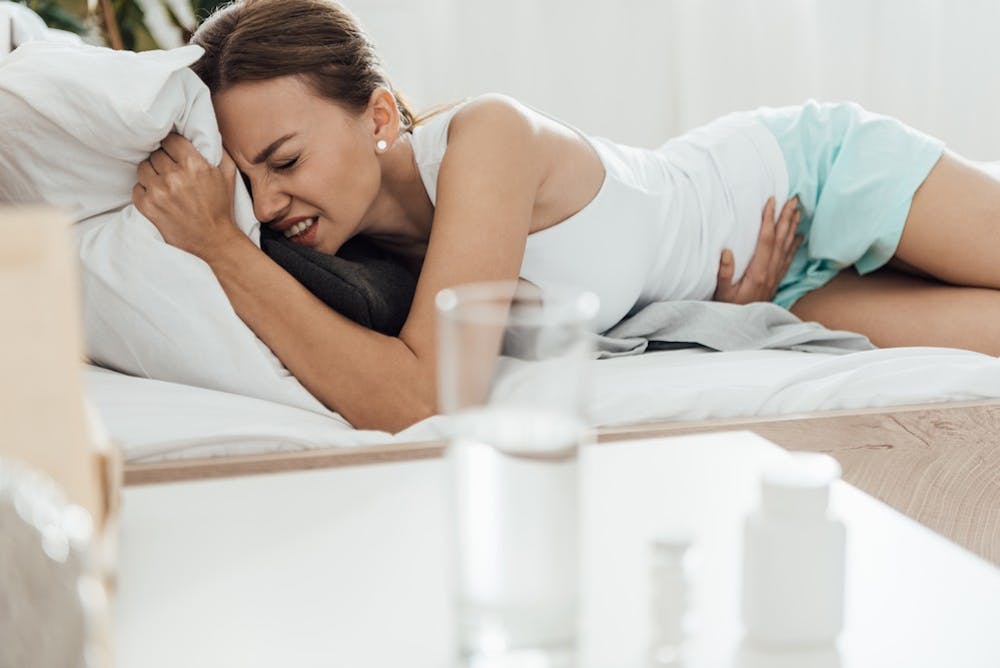There are many different methods that women use to ease their monthly PMS symptoms. This can include heating pads, painkillers, and light exercise. But if you haven’t tried using vitamins for PMS relief, you’re going to want to keep reading. Vitamins and supplements can be some of the most effective ways to support you during menstruation.
1. Boost Your Mood
Many women have period-related mood swings. Some of these feelings can include being overwhelmed or out of control, randomly crying without reason, loss of interest in activities, sudden bouts of sadness, sensitivity to rejection, social withdrawal, irritability, and even increased levels of anxiety or depression. Overall, the emotional symptoms that occur just before and during menstruation can be debilitating for many women.
If you are someone who experiences these symptoms, then you should look for a vitamin or supplement that includes vitamin B6. Vitamin B6 helps to regulate serotonin and norepinephrine in the body, which are two of the main mood-boosting and stress-relieving hormones that we produce. In one clinical study, B6 (also referred to as pyridoxine) was shown to help with the regulation of the emotional symptoms of PMS, like depression and irritability.
It has also been found that B6 helps the body produce higher amounts of progesterone to help the system stay regulated. A deficiency in this area can significantly worsen PMS symptoms by exacerbating the dominance of estrogen in the system. This occurs when estrogen levels are high in relation to progesterone levels.
2. Help Regulate Your Flow
If you have noticed that your flow is particularly heavy, especially in relation to your friends or family members of menstruation age, you may benefit from a B12 supplement. Vitamin B12 helps to prevent a certain kind of anemia, which can be a contributor to excessive or heavy bleeding. It has been found that daily supplementation of B12 can help to replenish your red blood cells and relieve discomfort associated with heavy flow.
Additionally, if you are vegan or vegetarian, B12 intake should always be on your radar. This is due to dietary sources of B12 coming exclusively from animal products. Vegans especially need to be aware of their intake, which can come from fortified foods or vitamins. Taking a daily supplement is a good way to ensure you are getting adequate amounts of this essential vitamin.
3. Aid in Muscle Relaxation
Magnesium is one of those supplements that is essential for keeping many of the systems in the body running smoothly. Among the things that it helps to regulate is nerve and muscle function, and can even act as a natural muscle relaxer. There is research that supports the idea of magnesium, when taken with vitamin B6, as a muscle cramp reliever. It can also assist in hormone regulation, reduction of bloating, and getting a good night’s sleep.
Magnesium becomes even more important to supplement with as many women suffer from deficiencies in this essential nutrient. This is largely due to the way food is processed in places like the US as many foods that are naturally rich in magnesium become stripped of the nutrient during processing. If you suspect you may be deficient in magnesium, talk to your doctor about which supplements are going to be best for you.
4. Reduce Inflammation
Women who experience particularly bad period cramps should seek out vitamins that help reduce inflammation in the body. Inflammation can exacerbate or worsen period cramps, so instead of slamming back ibuprofen, try attacking the problem at the source. Omega-3 fatty acids work well at decreasing inflammation in the body. The inclusion of omega-3s can not only help reduce menstrual cramps but can also help with mood stabilization. Fish oil supplements are a common way for people to increase the amount of omega-3s in their diet. In fact, a 2011 study suggests that fish oil supplements may actually be more effective in relieving cramps than ibuprofen.
5. Promote Hormone Regulation
When it comes to regulating your hormones, healthy levels of vitamin D are going to be key to keeping your system balanced and stable. Vitamin D, in particular, is important as high doses of vitamin D are not available in many foods. Keeping your hormones regulated is essential to ward off many of the common symptoms associated with PMS. When a high dose of vitamin D3 is taken, the production of prostaglandins decreases. Prostaglandins are a hormone-like substance that could be the root cause of menstrual cramps.
Conclusion
Try out a vitamin or supplement that includes some of these essential nutrients to help relieve your PMS symptoms. Additionally, make sure you are talking to your doctor to see if you have any specific deficiencies that need to be addressed directly.


